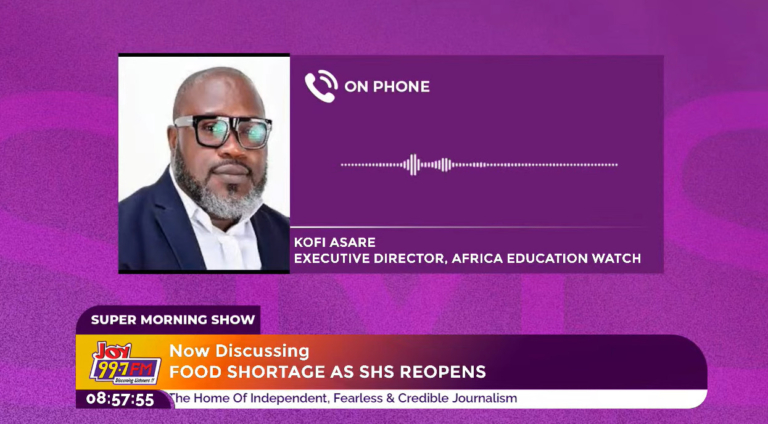
Audio By Carbonatix
Executive Director of Africa Education Watch, Kofi Asare says even though food shortages are being recorded in some SHSs, there is enough food to supply.
Speaking on Joy FM’s Super Morning Show, he explained that "while some food items are available, there is a shortfall in essential ingredients, largely due to systemic and political challenges.”
“Rice and some other staples are sufficiently available,” he noted, “but there’s a scarcity of key ingredients due to liquidity challenges. The issue isn’t about the total absence of food, but the lack of essential items to make up a complete food basket.”
According to Mr. Asare, schools depend on food supplies from the National Food Buffer Stock Company, which delivers 18 centrally procured food items. Schools then use their subventions to purchase perishable items like fish and eggs locally. However, certain ingredients, such as bread, have become a rare commodity in many schools, forcing students to adjust.
Mr. Asare attributed these challenges to the ad hoc nature of the Free SHS feeding policy, which he said is far from being a structured system. He also highlighted the influence of political transitions on food supply chains.
“Suppliers have shown significant caution in food deliveries since September due to uncertainties surrounding political transitions,” he said. He explained that such transitions often result in delayed payments, making suppliers hesitant to continue operations.
Adding to the complexity, he pointed out that the National Democratic Congress (NDC) has pledged to abolish the current centralised food procurement system , favouring a decentralised system where schools manage their own procurement under supervision from the Ghana Education Service. This, he said, has created additional uncertainty for suppliers who fear being excluded from future contracts.
Mr. Asare concluded that addressing these issues requires solving the liquidity problem and transforming the Free SHS feeding programme from an ad hoc arrangement into a sustainable and efficient system.
The food shortage issue, he emphasised, is not new but demands a long term solution to ensure consistency in the feeding of students.
Latest Stories
-
Ghana is rising again – Mahama declares
5 hours -
Firefighters subdue blaze at Accra’s Tudu, officials warn of busy fire season ahead
5 hours -
New Year’s Luv FM Family Party in the park ends in grand style at Rattray park
5 hours -
Mahama targets digital schools, universal healthcare, and food self-sufficiency in 2026
5 hours -
Ghana’s global image boosted by our world-acclaimed reset agenda – Mahama
6 hours -
Full text: Mahama’s New Year message to the nation
6 hours -
The foundation is laid; now we accelerate and expand in 2026 – Mahama
6 hours -
There is no NPP, CPP nor NDC Ghana, only one Ghana – Mahama
6 hours -
Eduwatch praises education financing gains but warns delays, teacher gaps could derail reforms
6 hours -
Kusaal Wikimedians take local language online in 14-day digital campaign
7 hours -
Stop interfering in each other’s roles – Bole-Bamboi MP appeals to traditional rulers for peace
7 hours -
Playback: President Mahama addresses the nation in New Year message
8 hours -
Industrial and Commercial Workers’ Union call for strong work ethics, economic participation in 2026 new year message
10 hours -
Crossover Joy: Churches in Ghana welcome 2026 with fire and faith
10 hours -
Traffic chaos on Accra–Kumasi Highway leaves hundreds stranded as diversions gridlock
10 hours

